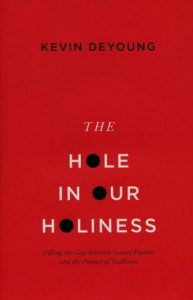Pastor Biggs wrote the following review for the upcomming edition of New Horizon’s:
“The Hole in Our Holiness: Filling the Gap between Gospel Passion and the Pursuit of Godlinessâ€
Charles R. Biggs
The Bible teaches us that “without holiness no man shall see the LORD.†The glory of God and our holiness are the end goals of our salvation (Eph. 1:4-5). J. C. Ryle wrote in the 19th century: “We must be holy, because this is one grand end and purpose for which Christ came into the world….Jesus is a complete Savior.â€
Pastor Kevin DeYoung in this very clear and pastorally concerned book says that the problem in many congregations today is that “there is a gap between our love for the gospel and our love for godliness†(pg. 21). We love to hear the gospel (as we should!), but we are not as earnest about our love for holiness.
DeYoung faithfully guides the reader past the errors of what holiness is not, and addresses the grave dangers of legalism and antinomianism in the Christian life (pgs. 33-47).
We are saved by grace alone through faith, but we are saved for, or unto good works (Eph. 2:8-10; pg. 25). Redemption is salvation from the penalty and the power of sin. We are forgiven and set free to serve God obediently (pgs. 63ff). As our Lord Jesus said: “If you love me, keep my commandments.â€
As a help for growing in holiness, DeYoung makes the important distinctions between the indicatives and the imperatives in Scripture. The indicatives are the reality of who we are in Jesus Christ, and the imperatives are those commands that we do in light of who we are in Christ (Col. 3:1-4).
In Christ, believers can seek “extraordinary holiness through ordinary means†through prayer, Bible reading, and hearing the Word of God preached, as well as in fellowship with other believers and regular attendance to the Lord’s Supper. These are the means that Christ has provided for believers to grow in holiness and be like him (pg. 133ff).
DeYoung concludes reminding believers that we should seek to live a life of daily repentance. We always need God’s grace to grow, and when we fail, and when we fall short, we should seek the grace and mercy of Jesus, asking Him to help us in our weakness (pg. 137ff).
I commend the careful balance and pastoral tone of the writer, and the proper focus on the Triune God in the salvation of His people. This book will be outstanding for bible study groups, and has a helpful study guide at the end. This book I would recommend highly for all Christians, but especially those who are new Christians and new to the Reformed faith as a balanced and healthy guide to growing spiritually in Jesus.
Pastor DeYoung concludes with this admonition: “God wants you to be holy. Through faith he already counts you holy in Christ. Now he intends to make you holy in Christ…God saved you to sanctify you…by His grace it can be yours†(pg. 146).
CRB
